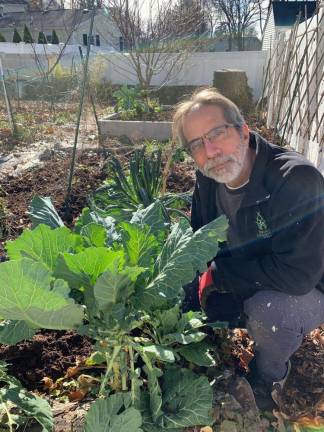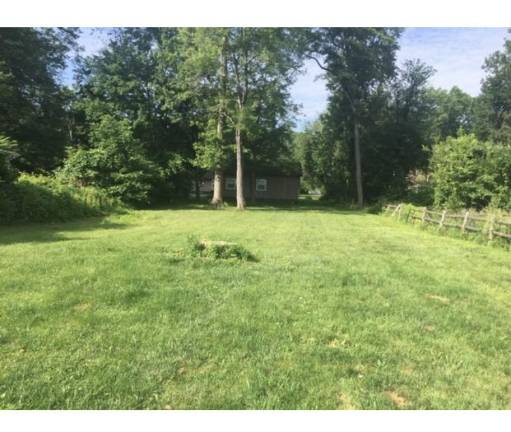The Tao of growing your own
Chad Pilieri founded Grow Local Greenwood Lake because he couldn’t not. Now to avoid burning out.


When did you get interested in growing food? Did you garden as a kid? It’s pretty funny, I’m from Brooklyn, and never touched any dirt or whatever. As I got older I started getting a little into Taoism. I just picked up a book one day when I was in corporate America and not too happy: The Tao of Health, Sex, and Longevity. It got me into some healthier habits, fasting and stuff. It’s a little weird, my story. Somehow it led me to a series of books called The Ringing Cedars. These are books from Russia, they’re kind of wild, it gets very religious. But the bottom line is, the book says, that by growing your own food, and having your own land, that’s the solution to change the world. I was like what? It seemed so simple. We were about to have a baby, my wife and I. At least I felt like I had a solution, because I was always very angry and protesting, and I felt like that wasn’t doing anything. Somehow this stuck with me: growing food is really a solution.
Are you a self-taught gardener? I took a permaculture design course. That kind of started my quest. And then I went a little crazy. My wife’s from Costa Rica. I wanted to move to Costa Rica, start an ecovillage, the whole thing. My wife was like, what the hell are you talking about? Then I’m glad I didn’t do that because I learned a lot more as the years went on. I tend to get hyper- excited, then I get intense, then I’m like oh what did I just do?
Ready, fire, aim. That’s how I operate too. Yeah, I get bursts of energy. I read something new, or I’ll see a documentary with a town growing food everywhere and I’m like, we have to do that right now. But then you realize that people have to be willing to do it with you.
So corporate America disagreed with you? Oh yeah. This is a long time ago. It was a good job but I felt just totally trapped. I was not cut out for corporate, I cannot go back to an office. My wife is built for it; I see her working from home. I found it very stressful, and really, buying that one book on Taoism, it literally changed my whole life. It led me to fasting and getting into yoga; that led me to massage therapy. I would love this Grow Local Greenwood Lake to be my career, but then I always feel like I’m against money – but then you also have to pay your bills [laughs]. But this is my real passion, I would love to do this all day. I imagine myself walking around the village, going to the community garden, helping people out. Someday.
What brought you to Greenwood Lake? I think I was going to eventually do this wherever I was. My wife was like, why don’t we get a place upstate? I love Brooklyn, but I like the idea of having my own land. We started looking way upstate, but she kept saying, where’s the train? When I came here I loved Greenwood Lake instantly. The beach; I couldn’t believe the whole town was walkable, it’s a little village. I had this real simplistic view of upstate New York, like everyone is hunting and these strip malls. Then we saw the house, it was cute. It was a pretty quick decision, which of course later I freaked out about, because you know I do spontaneous things and then I’m like what the hell did I do? But I love it here. That was three years ago in June.
How did you go from gardening in your yard to starting a nonprofit? Something really motivated me; again I probably saw one of these documentaries. I’m realizing this is really a small village. There’s 3,000 people here. If we got our stuff together, we could really supply our own food... It’s tricky in Greenwood Lake, the yards are very small, rocky.
In February of 2019 I was like I’m just doing this, I don’t care. I know what I did, I took Pachamama, a free online course with different speakers, all very motivational. They ask you these questions: What would you do if you were going to move forward in this movement? Where do you see yourself five years from now? Yeah, I would like to see people growing all over the place, people composting and potlucks. It kind of crystallized, I was like I need to do something right now. I sent out an email; I said I’m starting something where we’re going to grow food locally. I didn’t know what I was talking about.
My first bunch of meetings were my friends, they were just nice. They were like okay, sounds good, falling asleep. Most of them are business oriented. I kept going, nothing was going to stop me. I had meetings, I had events, a meet and greet and we had a nutritionist and an introduction to permaculture. I met with the mayor, Jesse Dwyer. When I met with him officially a year ago, I said I really visualize us growing a lot of food here. Jesse said, We have this lot we can’t build on because of the high water table, so would you want to do something with it? He was like, what’s your structure, and how are you going to pay for this? So I was like, Oh. I formed a board a few months ago. I became a not-for-profit, someone was nice enough to help me during coronavirus. I probably wasn’t ready for that. I was a little scared.
Talk about this new garden. We have a very nice community garden in Greenwood Lake but it’s individual plots, typical of community gardens. The garden I’m hoping to build, we’re going to have a member only area, then we’re going to share everything. People come out and we’ll weed and everything, then tell people you can take tomatoes home, share the harvest. We’re going to have an open area for the public, hopefully we can grow perennials, fruit trees and berries. There’s a nice area in the back, I want to do a lot of workshops and potlucks. Even as we’re building stuff I want people to come, you know, we’re going to build a compost bin, let’s watch how that’s done. I want to have a pizza oven in there.
It’s about 140 feet long, about 60 feet wide, it gets really great sun. There’s an issue with water, we’ll just have to find a way to get some more soil on it or gravel. It’s right in the middle of this block, it’s ideal. I’m driving myself crazy how to best utilize it. I keep coming up with new plans: let’s get a poly tunnel, and we’ll do mushrooms in the back. But I’m not really that qualified to do all these things.
Whatever. I’m like a pretty okay gardener, I’m not amazing. Last night I’m like what am I doing? I’m still working as a massage therapist, I have two young kids, I can’t be doing this garden by myself. Because the mayor’s smart, he’s like, I don’t want this, two years from now, to be overgrown weeds. There are a lot of places that do that. You have the initial excitement and then fizzle out. So that’s important, too: how do you keep a movement going? How come all the things we do, the people in our field, tend to run out of steam? And then some of the crazy things we do in society, people do without any question.
That seems to happen a decent amount: burnout. ‘Cause someone like me is doing everything, and then you just kind of crash and burn. Then you see, oh Joe went off to the mountain and was never seen again. Or became an accountant.
I definitely have a lot of energy, and I believe our times, they really are changing. I do think food is very important, and food security is going to be a very big issue, so why not make it fun? The better we prepare ourselves – not in a prepper way with guns, but food growing down Windermere Avenue. If 15 percent of us have stuff in our backyards, we have food in our community gardens, and we find a way to store the food. Maybe someone’s good at canning. I think that all could be really fun. It doesn’t have to be anything that’s really difficult. But you know, we’ll have to change the way we eat. I just don’t know, five or six years from now, there won’t be serious issues with the food supplies.
Do you think the pandemic has accelerated some of the shifts that society needs to be making? Yes. That’s the crazy thing going on right now. I’m not even sure I’m religious or not, but it does appear there is this incredible cosmic force saying to everyone: stop. Stop what you’re doing, stay home. Then there’s also the other message of fear.
I think more should be asked of us than just stay social distanced and put a mask on. We have to make other decisions. We could have used this time to say, you know, we have to change the way we eat. I think so many people are dying of coronavirus because they’re not healthy. So I believe this is the time. I think a lot of people are not getting that message somehow. To me I don’t think it could be any clearer, but I don’t want to be preachy. My wife yells at me: you’re such a know-it-all. But at the end of the day I think it’s pretty obvious that you can’t keep on shipping food 2,000 miles. And I happen to be vegetarian, but there’s going to be issues with these large feedlots, you know, 10,000 cows, that’s just not something that continue realistically. I do feel this would be an ideal time to start really transferring over.
Do you have a role model? I would say Helena Norberg-Hodge, of Local Futures. She has a movie called The Economics of Happiness, she’s literally just saying the importance of localizing and small. She’s been saying this for 30, 40 years now, very consistent in her message. It’s very easy to get pulled into different directions. I don’t think technology is going to save us, I don’t think all these miracles are going to come along, I think we have to just do it small and local.
Any mistakes you’ve learned from? I’m probably a bit abrupt, so I hope I’m not turning people off. I don’t know, they wouldn’t say it to my face. But I would hope to be an appealing spokesperson. That’s something I could work on.I’m kind of figuring it out as I go. I’m trying not to spread myself too thin. I definitely want to focus on Greenwood Lake. I think it’s always best to start out where you live, where you are. I think that’s the best way to do things, by example.